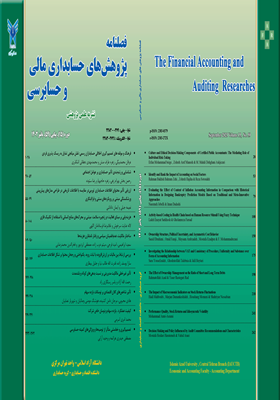Identify and Rank the Impact of Accounting on Social Factors
Subject Areas :
Rahman Bahramzehi
1
![]() ,
Zohreh Hajiha
2
*
,
Reza Sotoudeh
3
,
Zohreh Hajiha
2
*
,
Reza Sotoudeh
3
1 - Department of Accounting, Zahedan Branch, Islamic Azad University, Zahedan, Iran
2 - Department of Accounting, East Tehran Branch, Islamic Azad University, Tehran, Iran. Corresponding Author
3 - Department of Accounting, Nikshahr Branch, Islamic Azad University, Nikshahr, Iran
Keywords: Social Factors, extra-organizational factors, Keywords: Accounting,
Abstract :
AbstractToday, social problems are among the issues that have been the subject of political debates, and the search for solutions to these problems has become particularly important. Social responsibility accounting is a response to these problems that by considering the social consequences of decisions, such as their economic effects, tries to expand the scope of traditional accounting and requires new criteria to define social goals and assess progress in achieving these goals. Therefore, the purpose of this study was to identify and rank the impact of accounting on social factors. This is a practical and descriptive-exploratory and correlational research that was conducted in 1400. The statistical population in the stage of identifying the components of the research model, the opinions of 20 experts familiar with accounting by snowball method were used. The city of Tehran was used. In the present study, in order to analyze the data of the qualitative section using the analytical techniques of Strauss and Carbin (1998), the concepts as a unit of analysis in the levels of the whole text of the interview were extracted with open source and for the findings of the quantitative part of the modeling method. Structural equations and smart pls software and Friedman test were used to rank the components. Finally, the results showed that accounting has a positive and significant effect on social factors such as investment decisions of investors, creditors in maintaining their interests, banks and financial institutions in accreditation, tax organization in fair tax collection and also the average rating, component. Assisting the tax organization by speeding up the taxation process with various methods of the accounting system has the highest rank and helping owners and investors to use their funds and the legality of their use is of the least importance to respondents.
میرجعفری دهزاد، سیده مستانه، عماد احمدنژاد و سیدحسین حسینی گواسرایی، (1397)، "فساد مالی و بررسی نقش حسابداران در پیشگیری و رفع آن"، دومین کنفرانس بینالمللی تحولات نوین در مدیریت، اقتصاد و حسابداری، تهران، مؤسسه آموزش عالی علامه خویی (ره) -شرکت بینالمللی کوش.
_||_Fafchamps, M., & Lund, S. (2003), “Risk-sharing Networks in Rural”.

